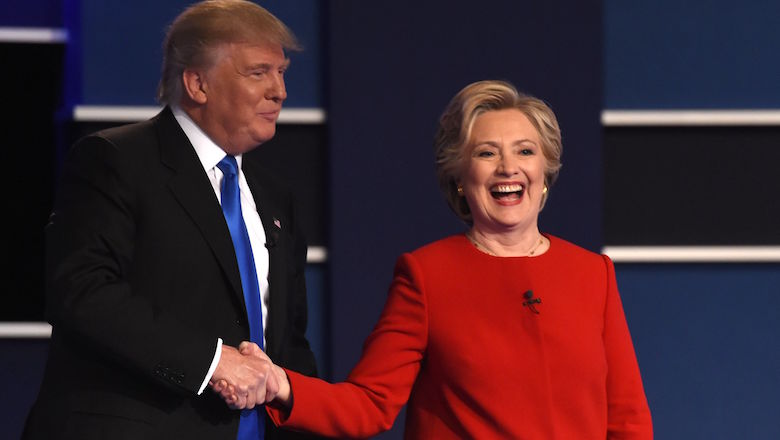
Candidates Donald Trump and Hillary Clinton shake hands at the first presidential debate. (Getty)
The second presidential debate of the 2016 election cycle will be held on October 9th, and it will take the form of a town hall meeting. Considering that questions will come from the audience, some of those in attendance at Washington University in St. Louis will have a significant impact on how the event goes. So who exactly gets to attend and speak with the candidates? How, and by whom, is this decided?
The audience members of the town hall debate will primarily be undecided voters who were selected and vetted by Gallup, according to the Commission on Presidential Debates. The CPD then decides how to allocate the remaining tickets, many of which will be given to university students via lottery, Bustle reports.
In the past, there have been some complaints about audience members in town hall debates not being properly screened and turning out to be far from uncommitted. Earlier this year, conservative commentator Michelle Malkin assembled a list of examples for National Review, pointing to debates where questions came from people who were later discovered to openly support one of the candidates or who actually worked in politics themselves.
“In an age of micromanaged partisan stagecraft and left-wing media enablers, there is no such thing as a spontaneous question,” Malkin wrote.
However, it’s important to note that her examples mainly came from debates that were run by television networks or by political campaigns. But the fall presidential debates are instead run by the non-partisan Commission on Presidential Debates, a group that generally does a much better job of vetting audience members and ensuring incidents like those do not occur. Few complaints have come up about the CPD’s past town halls, so you can almost certainly expect Sunday’s participants to legitimately all be undecided voters from the area.
That being said, the Donald Trump campaign has already raised some conspiracy theories about the Commission on Presidential Debates, including that they purposely messed with his microphone’s audio in order to sabotage him. So it would certainly not be surprising to see the Republican candidate question the objectivity of those in the audience if he gets a particularly challenging question.
The Commission on Presidential Debates has hosted each general election debate since 1988. It was in 1992 when the tradition of doing one town hall started, and that year, the format was specifically requested by Bill Clinton’s campaign, according to The Washington Post. The George H.W. Bush campaign agreed to the idea, and the rest was history.
Questions from the audience will only make up about half of Sunday’s presidential debate. The other half will consist of questions posed by the moderators, who in this case are CNN’s Anderson Cooper and ABC’s Martha Raddatz.
